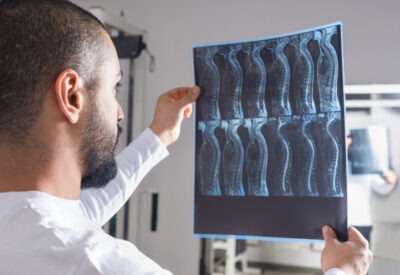
Spinal cord injuries can lead to full or partial paralysis in any part of the body. They are serious, requiring immediate medical treatment and often years of physical therapy and rehabilitation. If you have suffered an injury to your spinal cord after a Georgia accident, you are likely worried about how to pay for the huge costs of recovery. But you may not have to.
If someone else caused the accident that led to your injuries, you may be able to make a personal injury claim for your spinal cord injury and other damages.
Types of Spinal Cord Injuries
Your spinal cord, which runs from your brainstem to your lower spine, is about 17 to 18 inches long and contains millions of nerves. A healthy spinal cord is vital to many functions in your body, so if damage occurs, it can lead to a lot of problems.
How a spinal cord injury affects someone depends on where the injury happened along the spine. Here are the different types of spinal cord injuries (based on location) and their common symptoms.
Cervical Spinal Cord Injury
A cervical spinal cord injury occurs at the top of the spinal column where the first eight vertebrae—the small bones that form the backbone—are located.
Symptoms can include weakness or paralysis in the limbs. Someone with a cervical spinal cord injury can have paralysis in both arms and legs (known as quadriplegia) and may have trouble breathing on their own.
Thoracic Spinal Cord Injury
An injury to the thoracic spinal cord affects any of the 12 vertebrae in the top-middle areas of the spinal column.
Symptoms can include weakness or paralysis in the legs (known as paraplegia) and problems with bladder, bowel, or sexual functions.
Lumbar Spinal Cord Injury
This spinal cord injury happens in the spinal column’s lower-middle region, which has five vertebrae.
Symptoms can include paraplegia and weakness or paralysis in the lower body.
Sacral Spinal Cord Injury
A sacral spinal cord injury affects any of the five vertebrae located below the lumbar spine and above the tailbone. This type of spinal cord injury is less common than others, but it can still happen in an accident.
Each vertebrae bone affects a different nerve section, so symptoms of a sacral spinal cord injury may include weakness or loss of function in the hips and legs, bowel, or bladder. It can also affect sexual function.
Back pain can also be a sign of spinal cord injury or damage, so you should always see a doctor right away for any pain after your accident.
Get the strong arm
Complete vs Incomplete Spinal Cord Injuries
A spinal cord injury can also be either complete, when the spinal cord has been fully severed, or incomplete, where it is partially severed. An incomplete injury may still allow function in some areas of the body, while a complete injury will not.
How Fault Plays a Part in a Georgia Spinal Cord Injury Claim
To make an injury claim for a spinal cord injury, someone must be at fault for the accident. Under Georgia law, a negligent (or “at fault) person is anyone who violates their duty to exercise reasonable care and prevent others from being injured. In other words, if someone causes an accident and it leads to injuries, the person who caused the accident is at fault—and liable for damages.
A person or party can be negligent in accidents like:
- Car or truck accidents
- Drunk driving accidents
- Motorcycle or bicycle accidents
- Slip and fall and premises liability accidents
- Pedestrian accidents
- Medical malpractice cases
Spinal cord injuries are especially common in car or other motor accidents where the victim is hit while walking, bicycling, or driving their own vehicle. However, they can happen at any time.
To seek damages you’re legally entitled to, you will need to file a personal injury claim with the insurance company of the at-fault person or entity.
Damages You Can Claim After a Spinal Cord Injury Accident
The at-fault person in an accident is legally responsible for all damages resulting from that accident. Those damages can include:
- All medical costs of treating your spinal cord injuries (and any other injuries)
- Costs of rehabilitation and physical or occupational therapy
- Lost wages from missed work time
- Lost earning capacity if your spinal cord injury affects your ability to earn money in the future
- Pain and suffering
- Social disorders, anxiety, or depression caused by your injuries
- Fear, humiliation, or embarrassment
- Loss of enjoyment of life
You will need to keep detailed records of all damages you experience as a result of your spinal cord injury after the accident. That includes saving all medical bills, gathering pay stubs, and talking with your lawyer about pain and suffering damages that do not have a clear dollar value.
How Long do You Have to File an Injury Claim for a Spinal Cord Injury?
According to Georgia Code § 9-3-33, you typically have two years from the date of your spinal cord injury to file a personal injury claim. This time can go quickly, so it’s best to contact an Atlanta spinal cord injury attorney as soon as possible after you are injured. They can make sure your injury claim is strong and help you communicate with the insurance company throughout the process. The goal is full compensation of all damages.
Get Help With Your Georgia Injury Claim
Don’t face your personal injury case alone. At John Foy & Associates, we can help you through every step of the process—and fight for your right to full financial recovery. We have been helping injury victims win what they deserve for over 20 years. To get started with a FREE consultation today, call us at contact us here.
404-400-4000 or complete a Free Case Evaluation form

